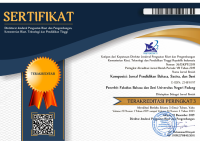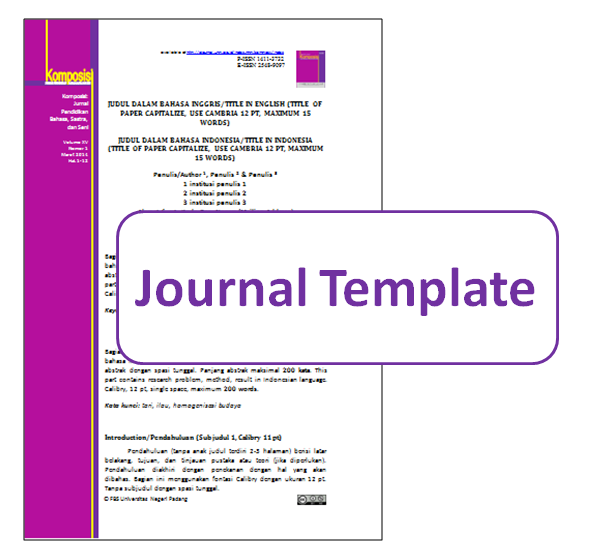IMPLEMENTATION OF BLENDED LEARNING MODEL IN IMPROVING LEARNING OUTCOMES OF WRITING SKILLS
Wisnu Nugroho Aji
Abstract
This research uses a quasi-experimental design model with the type of equivalent time series. This research aims to describe the application of the blended learning model in learning writting skills, so that learning outcomes and student responses can be known. The research sample are 25 students from the S1 Indonesian Language and Literature Education in academic year of 2020 by a purposive sampling method. The results of student responses as a whole, students feel very enthusiastic with the implementation of the blended learning model and enjoy the learning process. There are 90% of students stated that they were interested and liked the blended learning model. The results showed that the average students’ learning outcomes at each stage always increased. Stage 1 is 75,20 (B) and stage 2 is 92.30 (A). The increase in learning outcomes is evidenced by the average n-gain value in stage 2, which is 0.92 (high criteria). The conclusion of the research is that students' interest, motivation, and learning awareness increase after the blended learning model is applied to writting skills courses.
Keywords
writting skills, blended learning
References
Aji, W.,N and Sri Budiyono. (2018). IThe Theacing Strategi of Bahasa Indonesia in Curriculum 2013. International Journal of Active Learning. Vol.3 No.2. 58-64
Bentley, D. C., Robinson, A. C., & Ruscitti, R. J. (2015). Using guided inquiry and the information search process to develop research confidence among first year anatomy students. Anatomical Sciences Education, 8, 564–573. https://doi.org/10.1002/ase.1527
Curtis J. B. (2006). The Handbook of Blended Learning. USA: Preiffer.
Driscoll, M. and Carliner, S. (2005) Advanced Web-Based Training Strategies. Blended Learning as a Curriculum Design Strategy. ASTD Press, New York.
Elaine Allen, Jeff Seaman, and Richard Garrett. (2007). Blending In The Extent and Promise of Blended Education in the United States. Sloan-C™.
Graham C. R. (2006). Blended Learning Systems: Definition, Current Trends, and Future Directions. Dalam C. Bonk & C. Graham (Eds.), The Handbook of Blended Learning: Global Perspectives, Local Designs. San Francisco: Pfeiffer. 3-21.
Heinze, A. (2008). Blended Learning: An Interpretive Action Reseach Study. Salford: University of Salford.
Husamah. (2014). Perkuliahan Bauran (Blended Learning). Malang: Prestasi Pustaka.
Istiningsih, Siti and Hasbullah (2015) Blended Learning, Trend Stategi Perkuliahan Masa Depan. Jurnal Elemen. Vol 1 No 1, 49-56 DOI: https://doi.org/10.29408/jel.v1i1.79
Mana, L. H. A., Titiek F., (2020) Pengembangan RPKS dan SAP Menulis Berbasis Pendekatan Contekstual Teaching dan Learning. Jurnal Grmatika Vol. 2, No. 2 pp (84-100) doi doi.org/10.22202/JG.2016.v2i2.986
Nada Dabbagh dan Brenda Bannan. (2005). Online learning Concepts, Strategies, and Application. New Jersey: Pearson Education
Plomp, Tjeer and Donald P. Ely. (1996). International Encyclopedia of Educational Technology. Cambridge: Elsevier Science Ltd
Rachman, A., Yusep S, Dedi R (2019) Penerapan Model Blended Learning dalam Peningkatan Hasil Belajara Menggambar Objek 2 Dimensi. Journal of Mechanical Engineering Education, Vol.6, No. 2, 145-152 DOI: https://doi.org/10.17509/jmee.v6i2.21784
Sugiyono. 2015. Metode Penelitian Kombinasi (Mixed Methods). Bandung: Alfabeta
Sutisna, A. (2016). Pengembangan Model Perkuliahan Blended Learning pada Pendidikan Kesetaraan Program Paket C dalam Meningkatkan Kemandirian Belajar. JTP- Jurnal Teknologi Pendidikan, 18(3), 156-168. DOI: https://doi.org/10.21009/jtp.v18i3.5373
DOI:
https://doi.org/10.24036/komposisi.v23i2.114167
Refbacks
There are currently no refbacks.
Copyright (c) 2022 Komposisi: Jurnal Pendidikan Bahasa, Sastra, dan Seni
This work is licensed under a
Creative Commons Attribution-NonCommercial 4.0 International License .
Komposisi: Jurnal Pendidikan Bahasa, Sastra, dan Seni , a peer-reviewed online journal in languages, literature, and arts education.
Printed ISSN 1411-3732 , Online ISSN 2548-9097 .
Currently, Komposisi: Jurnal Pendidikan Bahasa, Sastra, dan Seni is indexed by: View My Stats
Visitors since February 2017:
<div class="statcounter"><a title="web analytics" href="http://statcounter.com/" target="_blank"><img class="statcounter" src="//c.statcounter.com/11239717/0/d5796c6b/0/" alt="web analytics"></a></div> View My Stats
Published by:
Universitas Negeri Padang (UNP) Address: Faculty of Languages and Arts (FBS) Universitas Negeri Padang. Jl Prof. Dr. Hamka Air Tawar Barat, Padang - West Sumatera -Indonesia Telp/Fax. +62751 7053363 Home page: http://ejournal.unp.ac.id/index.php/komposisi | e-mail:komposisi.fbsunp @ fbs.unp.ac.id | cc: havid_a @ fbs.unp.ac.id
Server Luar
slot88
King Wood Car Care slot gacor
scam
situs toto
bandar togel
bandar togel
Slot Gacor Hari ini
situs toto
situs toto
toto togel
togel online
topup murah
harapan777
AMDBET
toto togel
slot88
login bayar4d
macau303
slot resmi apk slot online Slot Maxwin
situs toto
sakti55
situs toto felix168
nextogel
NEXTOGEL
NEXTOGEL
NEXTOGEL
NEXTOGEL
NEXTOGEL
NEXTOGEL
NEXTOGEL
NEXTOGEL
NEXTOGEL
NEXTOGEL
NEXTOGEL
NEXTOGEL
NEXTOGEL
NEXTOGEL
NEXTOGEL
NEXTOGEL
NEXTOGEL
NEXTOGEL
NEXTOGEL
NEXTOGEL
NEXTOGEL
NEXTOGEL
NEXTOGEL
NEXTOGEL
NEXTOGEL
NEXTOGEL
NEXTOGEL
NEXTOGEL
NEXTOGEL
NEXTOGEL
NEXTOGEL
JEPETOGEL
JEPETOGEL
JEPETOGEL
JEPETOGEL
KIM369
KIM369
KIM369
KIM369
KIM369
KIM369
KIM369
KIM369
KIM369
KIM369
situs toto toto slot kuntogel
situs toto toto slot sendok88
togel online toto slot https://www.eaglehighplantations.id/
toto macau
slot gacor slot gacor
batak5d toto slot Slot88 www.onscripture.com
slot online
situs toto
situs gacor bandar togel resmi toto togel https://montreallawfirm.com
wild west gold sering pecah
Toto 4D
slot88
toto macau
Situs Toto
Situs Toto
https://mercubuana.org/
Toto 4d
toto 4d
Toto 4D
toto 4d
info rtp akurat malam ini
Wanita Subang Beli mobil dari Nolimit city
rahasia Cuan Aztech Gems
Gatot kaca Buat TKW Jadi jutawan
Rahasia sukses bermain Mahjing wins
harapan princess starlight
Harapan sweet bonanza
taktik gates of olympus xmas
dukungan gates olympus
rahasia sukses bermain mahjong ways
Situs togel
slot gacor 2025
luxury89
Sulebet
sulebet
oja89
basic4d
situs toto togel online
vipbet888
momo128 login
https://garudafood.org/
jpmania mesin128
mesin128
mesin128
oja89
slot gacor
jumat4d slot login
https://pintu-pro.id/
slot gacor
Buat yang suka cari link slot gacor hoki69 maxwin tiap hari, ini tempat yang paling sering gue datengin.
choicehomecontractors.com
sarangslot
slot 4d gacor hari ini
Toto 4D
https://up2m.pkr.ac.id/jepangbet/
slot
simpatitogel
slot gacor hari ini
slot gacor
slot
https://unesa.id/
xl bola
slot gacor
vega168
Togel 4D












